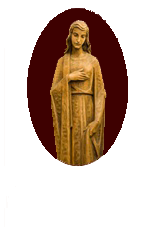This Week Letter – March 25, 2018
Dear Parishioners and Friends,
The scriptures of Palm Sunday, also known as the Sunday of the Lord’s Passion, show the culmination of the divine drama that came into the history of man. The great crowds coming to Jerusalem for the feast of Passover, covering the road with palm branches and crying out, “Blessed is he who comes in the name of the Lord,” seemed deeply convincing. Yet, the subsequent course of events proved, in the end, that the actions of Jesus of Nazareth were lost on these people. For even amidst their cheers the question arose: “Who is this?” The people from this crowd would cry out in a few days: “Crucify him!” We can see how little indeed they knew him when, by “democratic” poll, they backed Barabbas.
In light of the dramatic events of Holy Week, each and every one of us is challenged to answer the question that Christ already had asked his disciples earlier: “And you, who do you say that I am?”. The high priests and scribes, even before answering this question for themselves, already were “seeking a way to arrest him by treachery and put Him to death”. Since it was necessary for them to act “treacherously”, that meant there were no justifiable reasons for their actions. For this group of people, Christ was nothing less than a disquieting, point-blank dangerous person because he exposed their weaknesses.
The apostles also got lost in all of these events. It was not only Judas, seeking a convenient opportunity to hand Jesus over to the Jews, who went astray. In the garden of Gethsemane, human weakness also was seen in the three most prominent of the Twelve – Peter, James, and John, who were unable to persevere even one hour with Christ in prayer, “for they could not keep their eyes open.”
More admiration and respect are inspired by other Gospel heroes to some degree, like by the “good deed” of the sinful woman “with an alabaster jar of precious perfumed oil” anointing the body of the still living Christ for his future burial. Simon the Cyrenian awakes respect since he, though admittedly “forced”, still was drawn out from among those who were very near Jesus at this difficult moment. Arousing our respect are the women who were standing near the cross; and equally brave was Joseph of Arimathea, who claimed the body of Christ after it was taken down from the cross. Even the Good Thief, at the point of death, teaches us how an act of repentance can be made by a most sinful man when he finds himself in the presence of Jesus. Another paradox is worth noting: while the believers were deep in doubt, it was the pagan centurion who first drew religious conclusions from what had happened on Golgotha: “Truly this man was the Son of God.” How encouraging that Christ had someone for whom to die.
I am urging everyone to participate more deeply in the Holy Week and Easter Sunday experience through your expressions of love, gratitude, and openness during the Liturgies of the Easter Triduum and Masses. I thank all the priests, religious sisters, all our parish employees, volunteers and you, brothers and sisters in Christ, for your testimonies of faith and love in your everyday lives. I would like to thank all parishioners for their kindness and generosity in support of our parish. Let us all celebrate this feast in the spirit of faith, hope, love and mutual kindness.
God Bless!


